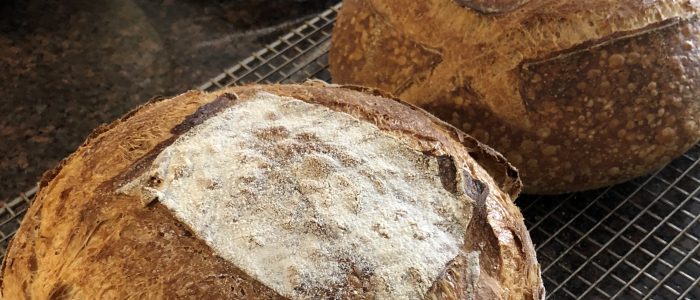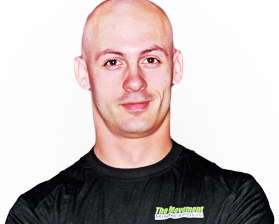
This past weekend I went to a sourdough bread baking class. As you know, since the beginning of the year I’ve been making bread pretty regularly, at least once a week. But bread making is a complex art and science, heavy on the practical insight and skill you develop by actually doing it over a long period of time. As a result there were specific pieces of my bread-making game that I felt could be improved by asking a couple questions of a master.
So I found this class taught by the head baker of La Colombe in Philly, John McGrath.
The 2-hour class was great, but I’ll be frank with you, I could have taught it. In the three months I’ve been baking I’ve done a deep dive, as I always do with new interests. I’ve hoovered up just about all the basics you need to know to get started making sourdough. In fact, there were probably some tips for the home baker that I’ve picked up or discovered that he has long since forgotten as a professional.
And yet, I got exactly what I wanted out of the class and I know it’s going to have an enormous impact on my baking. Here’s why:
Baking sourdough bread is about a 24-hour process, maybe 12 if you really push everything. How can you accomplish this in 2 hours then? John had smartly broken up the process into the distinct steps, and then taken some of the steps ahead of time so that we could do all the steps, albeit in a shorter amount of time and out of order. So we had dough that the bakery had prepared all the way up to the point of pre-shaping and shaping it into a loaf, which we did and we also made dough from scratch using the exact same ingredients as the former.
The net effect of this was that I was able to bring home two loaves of bread to bake, that were *almost* identical but with a couple steps in the process happening differently.
If you’re following me here, this ends up being a pretty great way to isolate which steps of the process are contributing certain effects.
I took both loaves home and baked them. The one John’s team made ahead of time and I pre-shaped and shaped was the best, almost a carbon copy of the one we baked in class that they did 100% of. So I know my pre-shaping and shaping is good.
The one that I made from scratch was way better than my usual, but not as good as the other one.
From this I can deduce that the differences are either the ingredients, the mixing, or the folding during the bulk fermentation. As it happens my ingredients are already almost identical to theirs, so I’ve reasoned that my hand mixing isn’t contributing to as much gluten development.
I could have spent another year trying to figure this all out, and in a two hour class I was able to isolate exactly what I need to work on. Plus, I was able to ask a few targeted, specific questions about the things I knew were the weakest links right now.
You, dear reader, may not care about bread baking, but I would bet you do care about improving a skill, your health, your fitness, or anything for that matter.
The hands-on practical experience and isolation of actual application is something you simply can’t get as a “transfer of knowledge” from reading a book or an article. It has to be lived and experienced.
And I think most people undervalue that kind of information living in a time when knowledge is not only no longer at a premium, there’s actually entirely too much of it.
It’s why the programs I create focus heavily on self-experimentation and gathering your own data, and it’s why my articles aren’t long “fact”-laden treatises on what the empirically best way to shear a sheep is.
I’m much more interested in impressing upon you the need to do your own practical experimentation, and giving you the tools and mental models for doing so.
Biofeedback, in your training for example, is the best such way I’ve found for doing so with strength and fitness. It does no good to know that “this” is the best way to do a pull-up, if “that” is the best (or only) way that works for you.
So my question is, how can you crack open the practice of the skill you’re trying to improve? Take a class? Hire a coach? Find a mentor?


Leave a Reply
You must be logged in to post a comment.